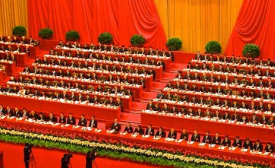united states

Since the beginning of the 21st century, China has been a rising star in the arena of public diplomacy. Its PD campaign, coordinated by the Ministry of Foreign Affairs, involves fourteen separate Departments, including the United Front Work Department, the Ministry of Commerce, the Ministry of Culture, and the General Administration of Press and Publication. [1] The colossal campaign aims to brand China as a responsible, peace-loving, and culturally sophisticated nation.
A popular online education platform has blocked its services from Cuba, Iran and Sudan to adhere to US sanctions on international trading. Coursera, the social entrepreneurship company to offer Massive Open Online Courses (MOOC), has more than 21 million student enrollments in over 180 countries. Coursera co-founder Andrew Ng told The Stream there have been thousands of failed attempts to login since the block was initiated last Friday.
In the fugue of tongues on New York’s streets, French has never been a dominant voice. And as surging numbers of Asian and Latino immigrants continue to tip the balance of foreign languages toward Chinese and Spanish, the idea of learning French, to some, may seem kind of quaint, even anachronistic.
It's a time-honored tradition: When a U.S. president gives his State of the Union address, interest groups pore over the carefully crafted remarks line by line, word by word, to assess the administration's priorities and blind spots. The exercise plays out, if to a lesser degree, overseas as well: The day after President Obama's sixth address, news outlets in Kiev, Beijing, and Tehran are picking apart references to their countries.
In 2013, Indonesia hosted the Asia Pacific Economic Cooperation (APEC) leadership meeting. Established in 1989, APEC has 21 member states that are committed to promoting trade and economic cooperation in the region. The summit was overshadowed by the absence of President Obama, who canceled his trip to manage the partial U.S. government shutdown.
President Barack Obama brimmed with optimism after he met with Colombian President Juan Manuel Santos in the White House last December. Obama lauded Colombia’s “tremendous progress” over the past decade and praised Santos for his peace talks with the Revolutionary Armed Forces of Colombia (FARC). He commended Santos’ efforts on human and labor rights, and hailed the “success” of the U.S.-Colombia Free Trade Agreement.
A State of the Union address is always a major public diplomacy moment. Rarely do you have the full attention of the entire world to tell every listener, watcher and tweeter, what exactly your current policy priorities are. For 2014, it is likely that President Obama will focus on domestic and international topics that are high up on America’s agenda and he is likely to stress that if Congress remains intransigent, he, the President, will have to use his Executive powers to make things happen in 2014 on the following issues.
On Super Bowl Sunday, the US might as well be on a different planet. American football’s annual crescendo is typically the country’s most watched TV show of the year, usually by a considerable margin. Last year’s edition was, by some measures, the third most viewed show in American broadcast history. But on the global stage, it’s a very different story.







